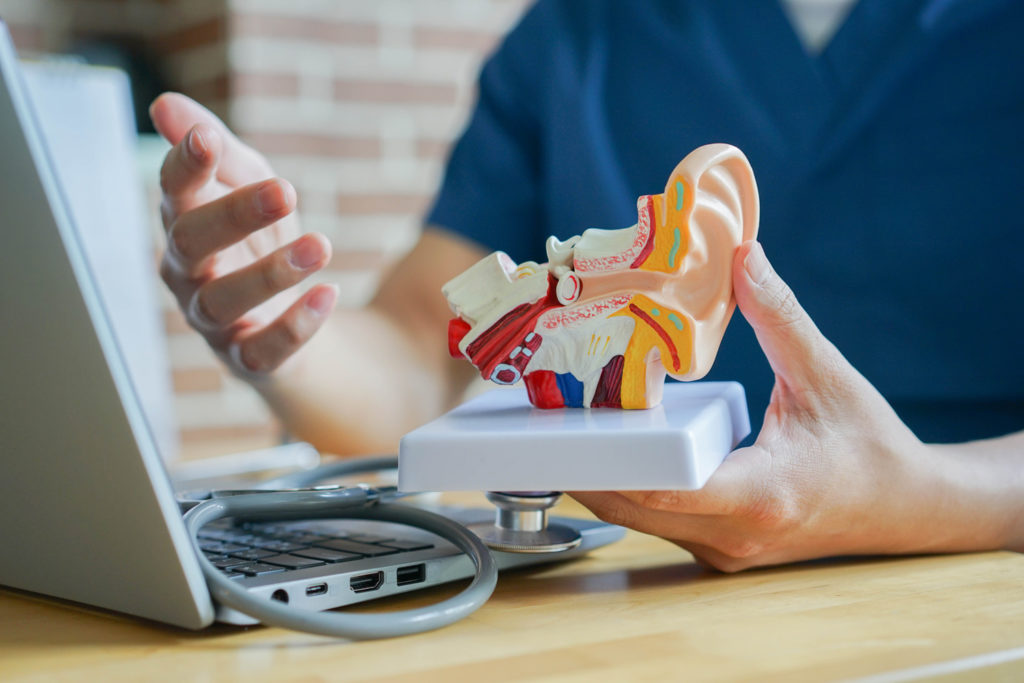While it’s far more common for children to experience the painful symptoms of an ear infection, it’s very possible for adults to develop them as well. In some cases, adult ear infections may lead to more serious medical conditions as well (e.g., hearing loss, meningitis, brain abscess, ruptured eardrum, or facial paralysis), so it’s important to know what their symptoms are and when it’s time to seek medical attention.
If your only symptom is an earache, the skilled specialists at Emerald Coast Urgent Care recommend waiting 2-3 days to see if the symptoms resolve on their own. But, if you’re still in pain or develop a fever after a few days, it’s time to seek urgent medical care to avoid further complications.
Causes of adult ear infections
Learn about the three types of ear infections as well as what causes ear infections in adults:
Inner ear
An inner ear infection, also called otitis interna, is most commonly caused by a viral infection. Viruses associated with inner ear infections include influenza, herpes, Epstein-Barr, and polio. The best way to prevent an inner ear infection is to wash your hands frequently, avoid sharing food and drinks (especially with someone you know to have an ear infection), don’t smoke and avoid secondhand smoke. Symptoms of an inner ear infection include:
- Vertigo (a sensation that you or your surroundings are spinning or moving around even when everything is still)
- Difficulty balancing or walking normally
- Dizziness
- Nausea or vomiting
- Difficulty hearing
- Feeling of fullness or pressure in the ear
- Tinnitus (ringing in the ear)
- Earache
- Headache
- Discharge draining from the ear
Middle ear
A middle ear infection is also called otitis media and occurs when a (cold or flu) virus or bacteria causes the area behind the eardrum to become inflamed. This condition is most common in children. The best way to prevent a middle ear infection is to practice cold and flu prevention (e.g., washing your hands frequently, getting vaccinated from upper respiratory diseases like the flu and COVID-19). Symptoms of a middle ear infection include:
- Ear pain, especially when lying down
- Discharge draining from the ear
- Difficulty hearing
- Headache
- Loss of appetite
Outer ear
An outer ear infection, also called otitis externa, is caused when water becomes trapped in the ear, usually after swimming or bathing. This creates a moist environment that helps bacteria or fungi grow. The best way to prevent an outer ear infection is to keep your ears as dry as possible (e.g., use a bathing cap, ear plugs, or custom-fitted swim molds). You can also ask your doctor if ear-drying drops are right for you. Symptoms of an outer ear infection include:
- Itching
- Swelling and redness
- Difficulty hearing
- Jaw pain and pain with chewing
- Swollen lymph nodes around the ear
- Cloudy, yellow, or pus-like discharge draining from the ear
While more than 80% of ear infections heal without medical intervention, if you are experiencing any of the symptoms listed above and your pain does not go away or improve within 2-3 days, visit Emerald Coast Urgent Care for effective, affordable treatment. Our skilled specialists are experienced in diagnosing and treating all types of ear infections, so you can start feeling better fast. We welcome walk-in appointments 7 days a week.




